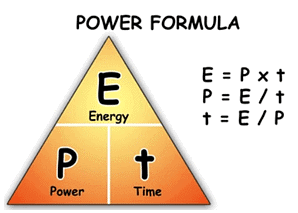Year 11 Exam > Year 11 Notes > Physics for GCSE/IGCSE > Power
Power | Physics for GCSE/IGCSE - Year 11 PDF Download
Power
- Machines like car engines continually shift energy from one energy store to another throughout a duration.
- The pace of this energy transfer, termed power, denotes the rate of work done.
- Time plays a crucial role in understanding power.
- When two cars expend an identical amount of energy or perform the same amount of work to accelerate over a distance, the one with higher power accomplishes this task in a shorter timeframe.

- Two electric motors raise an identical weight by the same height, yet one motor lifts it more rapidly than the other.
- The motor that elevates the weight at a faster pace possesses greater power.

- Appliances are assigned power ratings to indicate the energy transferred per unit time.
- Common power ratings are detailed in the table below:

Question for PowerTry yourself: What does power in a power machine represent?View Solution
Calculating Power
- Since power is defined as:
The rate of doing work - And work is:
Work done = energy transferred - Then, power can be expressed in equation form as:

- In the equations:
- W or ΔE represents the work done or energy transferred, measured in joules (J).
- t denotes time, measured in seconds (s).
- P signifies power, measured in watts (W).
- It's important to note that although these equations may be expressed differently, they convey the same concept - the transfer of energy over time.
- The rearrangement of this equation can be facilitated with the assistance of a formula triangle.

The document Power | Physics for GCSE/IGCSE - Year 11 is a part of the Year 11 Course Physics for GCSE/IGCSE.
All you need of Year 11 at this link: Year 11
|
127 videos|148 docs|35 tests
|
FAQs on Power - Physics for GCSE/IGCSE - Year 11
| 1. What is power in the context of physics? |  |
Ans. Power in physics refers to the rate at which work is done or energy is transferred. It is measured in watts (W) and is calculated by dividing work or energy by time.
| 2. How is power calculated in a system? |  |
Ans. Power can be calculated by dividing the amount of work done or energy transferred by the time it took to do so. The formula for power is P = W/t, where P is power, W is work, and t is time.
| 3. What are the different units used to measure power? |  |
Ans. Power can be measured in various units such as watts (W), kilowatts (kW), horsepower (hp), and BTUs per hour (BTU/h), depending on the context and scale of the system being analyzed.
| 4. How does power relate to energy consumption in everyday life? |  |
Ans. Power consumption is a key factor in determining energy usage and cost in everyday life. Understanding power can help individuals and businesses make informed decisions about energy efficiency and conservation.
| 5. How does power play a role in the performance of electronic devices? |  |
Ans. The power of electronic devices affects their performance, efficiency, and battery life. Managing power consumption is crucial in optimizing the functionality and longevity of electronic devices.

|
Explore Courses for Year 11 exam
|

|
Signup for Free!
Signup to see your scores go up within 7 days! Learn & Practice with 1000+ FREE Notes, Videos & Tests.
Related Searches

















